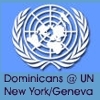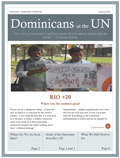

| BRIEFING - December 5, 2012 | To learn more about the Millenium Development Goals, click on the graphic Read the summer edition of the newsletter “Dominicans at the UN” (PDF) Past Briefings: November 16, 2012 October 17, 2012 September 26, 2012 September 12, 2012 August 29, 2012 July 11, 2012 May 30, 2012 May 16, 2012 April 18, 2012 April 4, 2012 March 7, 2012 February 22, 2012 February 8, 2012 January 25, 2012 January 11, 2012 |
|
Climate change is our responsibility, here and now In the Nov. 25 edition of the Sunday New York Times, there was a startling image on the front page of the Sunday Review section: the Statue of Liberty submerged under water. The feature article, “Is This the End? Whether in 50 or 100 or 200 years, there is a good chance New York City will sink beneath the sea,” presents us with a scenario that was once reserved for science fiction. However, it has become abundantly clear that truth can be stranger than fiction—and right in our own times. Many of us on the East Coast are still reeling in the aftermath of Hurricane Sandy. What we watched on the television, in the safety of our living rooms, during Katrina’s ravaging of New Orleans, has become part of our story, too. And, really, it is now a part of our collective story. In the words of a very wise person, “Climate change was predicted to arrive tomorrow, but it is happening today.” The article goes on, “We are in a new warming phase, and the oceans are rising… Hurricane Sandy gave only a modest preview of the dangers to come, as we continue to power our global economy by burning fuels that pollute the air with heat-trapping gases.” More than 6 million Americans live on land less than five feet above the local high tide. Not to mention the plight of low-lying countries like Bangladesh, or small island nations like the Solomon Islands and the Maldives. What more could it possibly take to convince us that we are literally on the verge of a “climate cliff”? Maybe nothing more is needed. According to a series of public opinion polls run during the Presidential campaign by the Yale Project on Climate Change Communication, 70 percent of Americans now accept that climate change is real; 54 percent acknowledge that the prime culprit is human activity; 74 percent believe that climate change is influencing our weather; 57 percent say it is a growing threat to the people of the United States; and 58 percent admit that they are worried about it. It is worth noting that these polls were taken before Hurricane Sandy. As I write this, delegates from more than 200 countries are gathered in Doha, Qatar, for the United Nations Conference on Climate Change, which runs through Dec. 7. At last year’s conference in Durban, South Africa, negotiators agreed to extend the Kyoto Protocol, the 1997 climate change treaty which expires at the end of December. This protocol identified increased atmospheric levels of greenhouse gases, such as carbon dioxide emissions, as a major factor in climate change, and set emission reduction goals for industrialized countries. The United States never ratified the Protocol. At the time the Protocol was adopted, China, India and Brazil, considered to be “emerging economies,” were exempted. Now, however, they are among the world’s largest emitters of greenhouse gases. To make matters worse, Russia, Japan and Canada have pulled out of the Protocol, claiming it is meaningless to extend emissions cuts on the major industrialized countries, when these “emerging economies” have no curbs on rising emissions. Developing countries, however, say it is vital that the developed nations lead the way. While the technical details of the Protocol may be well beyond our purview, the underlying attitude that positions its extension for failure is not: “We are not going to change, unless you do, too…” This basically amounts to a denial that the greater common good—of people and planet—is intimately linked to the decisions we make, both as individual nations and as an international community. Genuine leadership does what needs to be done—despite the unpopularity of the decision. President Obama has secured a second term, and he offered us all a ray of hope in his acceptance speech: “We want our children to live in an America that isn’t burdened by debt, that isn’t weakened by inequality, that isn’t threatened by the destructive power of a warming planet.” While President Obama was not as pro-active regarding climate change as many had hoped he would be during his first term, he has nothing to lose now. And, people like us need to keep reminding him of the importance of the work that must be done, and the attitudes that must change, if we are to move into a future that is healthy and secure. I recently came across a wonderful resource that I would like to pass on to you: the Mary Robinson Foundation for Climate Justice. Mary Robinson was the first woman to serve as President of Ireland (1990–1997). She also served as UN High Commissioner for Human Rights from 1997–2002. Much of her work since has been dedicated to advocating on behalf of human rights. She describes her center as one for “thought leadership, education and advocacy on the struggle to secure global justice for those people vulnerable to the impacts of climate change who are usually forgotten—the poor, the disempowered and the marginalized across the world. It is a platform for solidarity, partnership and shared engagement for all who care about global justice, whether as individuals and communities suffering injustice or as advocates for fairness in resource-rich societies.” Global climate change is not simply another “issue.” Rather, it must in some way direct our words, our actions, our very way of living on this planet. In the words of the Earth Charter, “it is imperative that we, the peoples of Earth, declare our responsibility to one another, to the greater community of life, and to future generations.” Our work on behalf of climate justice is a significant part of this responsibility which we all share. Resources Not Too Hot to Handle: New Energies for Preaching Truth to Power (presentation given by Justice Promoters at the convocation of the Dominican Sisters Conference, October 2012) — PowerPoint (PDF file 1.5 MB) | Text (PDF file 48 KB)
|
Dominican Leadership Conference
Building relationships and collaborating in the mission of preaching the Gospel
29000 West Eleven Mile Road
Farmington Hills MI 48336
248-536-3234 Contact: Executive Director

